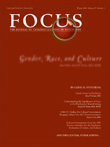Addiction Is a Brain Disease, and It Matters
Abstract
Scientific advances over the past 20 years have shown that drug addiction is a chronic, relapsing disease that results from the prolonged effects of drugs on the brain. As with many other brain diseases, addiction has embedded behavioral and social-context aspects that are important parts of the disorder itself. Therefore, the most effective treatment approaches will include biological, behavioral, and social-context components. Recognizing addiction as a chronic, relapsing brain disorder characterized by compulsive drug seeking and use can impact society’s overall health and social policy strategies and help diminish the health and social costs associated with drug abuse and addiction.



